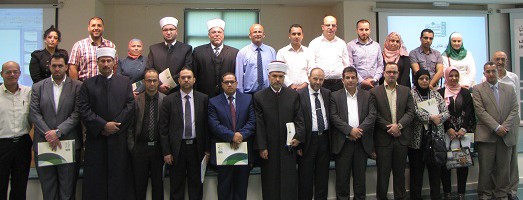The Institute of Law of Birzeit University launches the Specialised Diploma Programme in Legal Skills
Birzeit - 14 September 2015: The Institute of Law (IoL) of Birzeit University launched the Specialised Diploma Programme in Legal Skills for the third consecutive year.
The event hosted Mr. Ahmed al-Shurafa, representative of the United Nations Development Programme (UNDP), Dr. Ghassan Faramand, IoL Director, and Mr. Mahmoud Alawneh, Manager of the IoL Legislative Support Department (LSD) and Diploma Programme Officer. In addition to the training team, the launch event brought together representatives of partner justice sector institutions, including the High Judicial Council (HJC), Ministry of Justice (MoJ), Palestinian Anti-Corruption Commission (PACC), Public Prosecution, and High Council of Family Courts.
Having welcomed the speakers and participants, Dr. Faramand highlighted significance of the Specialised Diploma Programme in Legal Skills. This is an indispensable prerequisite to delivering any function at state institutions. Participants are central to the participatory training process initiated by the Diploma Programme. With a particular focus on applied aspects, training, and relevant professional ethics, training materials are different from other academic courses taught at faculties of law in Palestine.
According to Dr. Faramand, this third year of the Specialised Diploma Programme in Legal Skills is distinctive of coaching. With a view to embracing a participatory approach to the training exercise, coaching is designed to optimise training outcomes by involving supervisors, including immediate managers, of participants in the Diploma Programme activities. This way, relevant institutions can monitor and evaluate participants who are trained in the Diploma Programme. Engaging both the participants and their respective agencies, a participatory, interactive environment is created to achieve a maximum theoretical and practical output, provide capacity building, and enhance professional skills of participants, positively reflecting on and driving development the overall institutional setting.
Mr. Al-Shurafa asserted that the Specialised Diploma Programme in Legal Skills was an extension of diligent efforts made over previous years. “To consolidate rule of law and accountability, the UNDP is proud to be supporting the Diploma Programme in the context of joint activity with Palestinian institutions and civil society organisations.” Mr. Al-Shurafa highlighted that the UNDP has paid special attention to building permanent and solid partnerships with all institutions, which serve and contribute to administrative reform, gender equality, accountability, and respect of rule of law in Palestine.
Mr. Al-Shurafa concluded that the equation of peace, security and sustainable development was doomed to fail without effective and efficient justice delivery. Justice is the basis of government and a prerequisite to stability. Within the justice sector, due attention needs to be paid to integrity and transparency, which play a pivotal role in consolidating the state and maintaining institutional credibility. This, and similar, programmes are important as they ensure sensitisation, provide capacity building to justice sector actors, and help establish institutional values. Should these values be fulfilled, citizens will be content with the judicial system. Otherwise, the judicial apparatus will definitely lose credibility.
Highlighting its significance, Mr. Alawneh introduced the Specialised Diploma Programme in Legal Skills and explained the training methodology and the objectives it seeks to achieve. The primary goal is to deliver an educational programme that equips participants with legal expertise as well as professional and practical skills to help them carry out relevant legal functions most perfectly. The Programme also improves professional skills and supports practical experience to help participants carry out legal functions both competently and effectively.
In addition to coaching, Mr. Alawneh stated that a number of courses have been developed and introduced in light of justice sector needs. Based on an informed needs assessment, training materials justice providers wished to add to the Diploma Programme have been reviewed and evaluated. Addressing Palestinian legal and institutional systems, these courses are tailored to develop the legal profession and legal education, promote principles of justice and respect of rule of law, and equip participants with new legal skills.
Mr. Alawneh expressed his thanks to partners, including heads of justice sector institutions, for their unrelenting cooperation in making the Diploma Programme a success for the third consecutive year. He thanked the UNDP for their ongoing support of IoL programmes, including the Specialised Diploma Programme in Legal Sills. Mr. Alawaneh also showed gratitude to all IoL and UNDP support teams, trainers, and technical staff of partner institutions.
For the third year running, the IoL has been offering the Specialised Diploma Programme in Legal Sills in partnership with justice sector actors and with support from the UNDP. Earning evaluations beyond expectation by partner institutions, two classes have already graduated from the Diploma Programme. The Programme has successfully contributed to developing institutional performance of relevant partner organisations.






